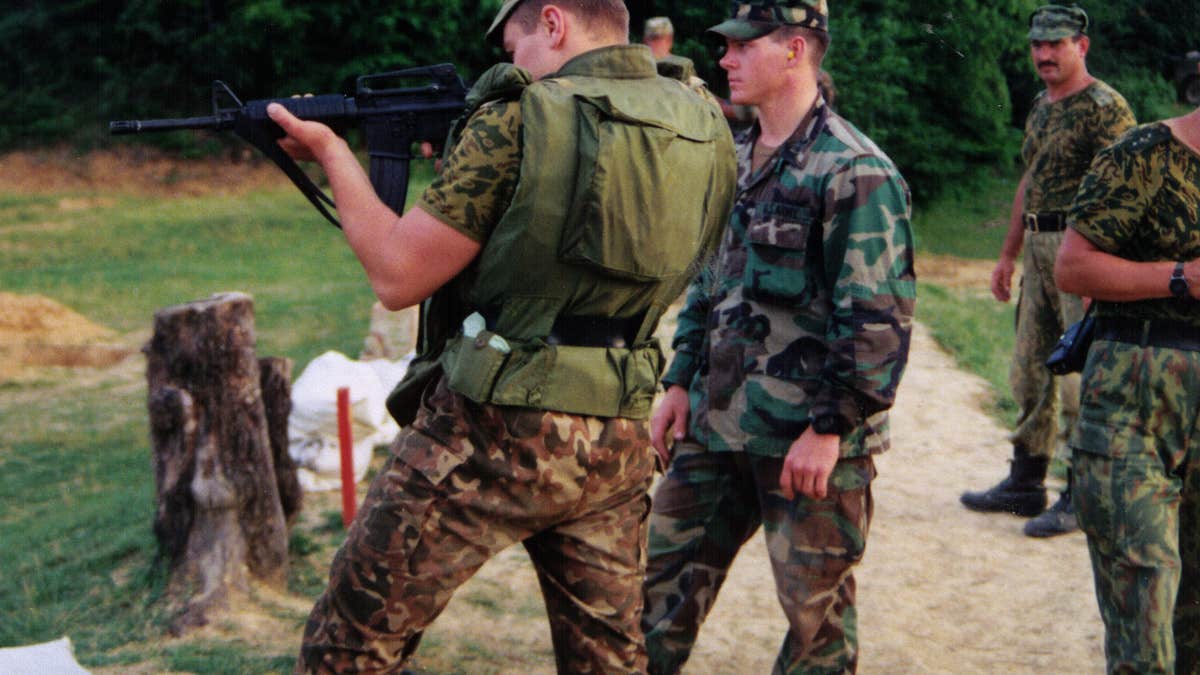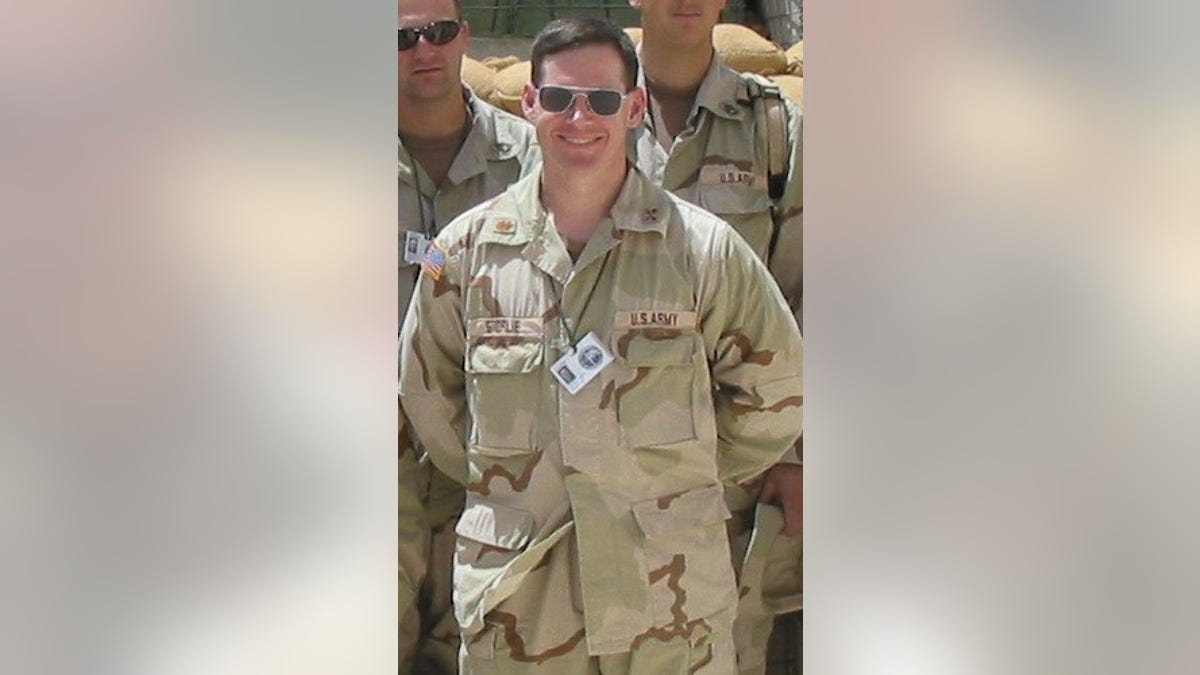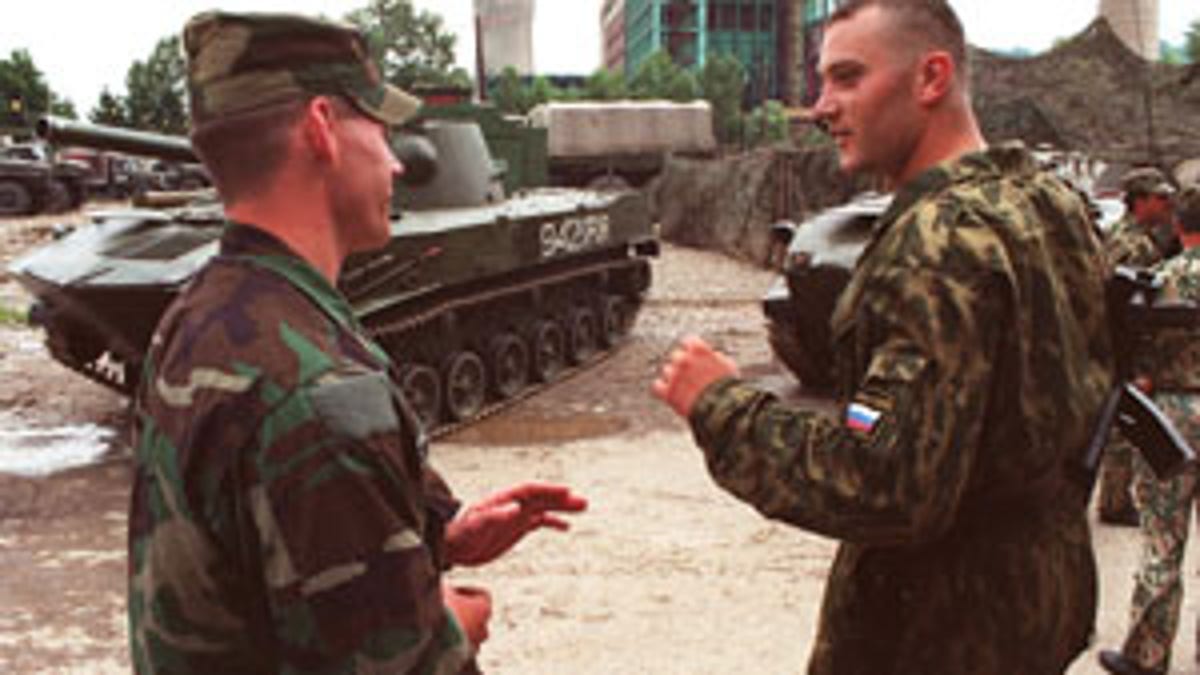
Photo was taken in 1997 with a Russian Airborne Reconnaissance Platoon. Training is important for all soldiers. (Courtesy of the author)
This January, I returned to the state I grew up in. I left in 1985 after graduating from high school and I’ve only been back maybe six to eight times.
I’ve spent the last 33 years in combat zones, training soldiers for war, helping companies succeed, writing for business publications, living in five different countries, and seeing the best and worst that humanity can produce.
The lessons in character and values from my hometown made me come back and, more importantly, shaped me into a military, business, and education leader.

Chad Storlie in center. (Courtesy of USAA)
The lessons that I learned from my small hometown apply to every small town and apply as much today as they did 40 years ago. Here they are:
Humility is a Leadership ‘Must Have.’ One of my favorite teachers from high school was coach “Tougher-Than-Nails.” He served in the local Army National Guard unit, was a coach for hockey, soccer and football, and an excellent teacher.
CLICK HERE TO GET THE FOX NEWS APP
If anyone should have been an overly proud leader, it was Coach Tougher-Than-Nails. Yet, he was humble, helpful, and was honestly interested in making every person he met better.
His humility was not softness; he had incredibly high standards of performance and would suffer no excuses for not doing your best and not trying to win even if only three seconds remained on the clock.
This lesson of the vital importance of humility and effective leadership remained with me my entire life even as I rose in education level, military rank, and corporate accomplishments. No matter what you accomplish, be humble and always help others.

Mine strikes in post-war Bosnia was very high among children. Chad Storlie's team "adopted" a small village in central Bosnia and we brought coloring books, markers, paper, and other supplies to their school. This is in 1996, a Romanian soldier is second from the right. (Courtesy of the author)
We Are All Teachers. Today, I assist the local university as a data and marketing analytics adjunct professor. When I grew up, there were always people helping me learn. My boss at the local cafe taught me how to make cinnamon rolls, my neighbors taught me to weed a garden, friends from school helped me understand computer languages, and my dad taught me how to shoot.
In a small town, we often forget that everyone is a teacher.
In the military, no matter my role, I taught soldiers how to shoot, how to communicate on radios, how to plan operations, and how to react to enemy attacks.
Everyone is a teacher for anyone willing to learn. Teaching is a task that every leader in every role needs to embrace.
Be Afraid of Not Trying, Not of Failing. In high school, I was an unremarkable athlete. My soccer coach and my tennis coach believed in the power of maximum effort and maximum attitude makes up for any deficiencies in talent.
Losing was understandable, if and only if, you had applied very last percent of your passion, strength, energy, and motivation to make a win a possibility.
In the military, I went through as many schools as I could find: Ranger School, Special Forces, Special Operations Jumpmaster, and the list continues.

Chad Storlie was a member of the 10th Special Forces Group from 1995 to 2000. This is a typical picture before doing a helicopter static line jump at Fort Carson, CO. (Courtesy of the author)
As these schools became increasingly more difficult, I applied the same lessons of passion, motivation, and hard work from high school sports to my military training.
The lesson to always try and to do your best held true in the tough Army training of Fort Benning and Fort Bragg.
My high school coaches and high school sports taught me that we fail only if we don’t even try to the utmost of our ability.
Hard Work Is Only Hard When You Don’t Help Others. In the summers between college, I worked laying sod and doing landscaping with friends from high school. At best, laying sod in the mud, rain, dust, and heat is soul crushing. The secret was that we all helped each other out. We brought snacks, water, AC/DC cassettes, and endless cans of Mountain Dew for everyone and found a shady spot for someone to sleep off a hangover from the night before.
This same attitude of teamwork is what powers a Special Forces “A” Team, a group of 12 Special Forces soldiers that I led for two years through the hostile peace in Bosnia.

Photo was taken when Chad Storlie was a member of a Special Forces Planning Team in Iraq. (Courtesy of the author)
In Iraq, I was part of a unique Special Operations planning team that worked 18-20-hour days for an entire year planning operations for “A” Teams conducting combat operations inside Iraq.
In Iraq, Bosnia, and Korea, we all helped each other with every task.
No matter the task and no matter how hard the work, everyone works to help the team succeed.
“We Don’t Care Where People Come From, Only That They do a Good Job.” I can’t remember where this quote came from, but it seemed to power my hometown.
When I was about 10, we had Vietnamese families come to resettle in our community after the fall of South Vietnam. The Vietnamese were new to our hometown, but they worked incredibly hard and did a great job at whatever they did. One of my greatest loves from the U.S. Army and my small hometown is the commitment to high standards that are voiced and applied equally to all.
In the Army, like a small town, when there is work to be done, no one cares where you come from, what your last name is, and where you live. All people care about is how well you do the job.

Cpt. Chad Storlie (left) talks with a Russian paratrooper during Russian Airborne Day, at Camp Ugljevik. Storlie is from Company A, 2nd Battalion 10th Special Forces Group. (Courtesy of the author)
High standards that are clear, communicated, and applied equally are what makes people and companies great at their jobs.
Look for What Else You Can Do to Help. My dad was a member of the Optimist Club. One of the main tasks for the Optimist Club, when I was growing up, was to help set up the water stations for the annual town celebration and road race.
Every year, we woke early, filled water jugs, got 10,000 Dixie cups, trash bags, and went out to intersections in the rural roads around our town to set up the water table for runners. After setting up my station, I sat down to rest. Wrong answer from my dad. His response, “Look around for what else you can do to help.”
Turns out, as expected, there were more trash bags to set up and some old trash in the ditch to pick up. I used this concept of always looking for what else can be done constantly in the Army because there is always more you can do to help.
Now that I’m back, I want to add as much as I can to the community that aided me so much when I was young.
I am doing my best to live the values that I was taught. I teach, I work hard at my job, I help veterans in their careers, and I teach my boys to be good men.
I’ve seen a lot of the world, but the best parts to me are the fields, farms, people, woods, streets, and lakes of small-town America.